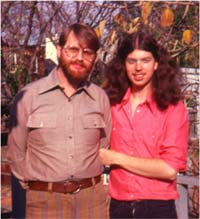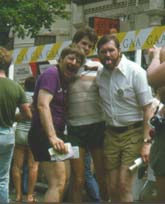 |


|
|
By Ted Richards
These incorrect and redundant lines do not describe the Otto I knew for the past 30 years. He was a strawberry blond. If you look up the expression "Walking Encyclopedia" in the right dictionary you might find a photo of Otto Ulrich.
We also discovered another shared passion--felines! He had five cats when we first knew him: Octavio, Gattico, Mathilde Wesendonk, Ping, and Pong are names we remember. He playfully scolded them--"Quit tromping!"--as one of them crossed the room during a listening session. Otto read many Central European Languages: Czech, Polish, Russian, Ukrainian, Lithuanian, Bulgarian, in addition to German and the Scandinavian Languages; thus his career reading, abstracting and indexing medical journals from those countries. Otto was not litigious but was not afraid to pursue those who infringed on his civil rights. In the 1960's while I still felt constrained as a public school teacher from openly protesting anti-gay bigotry, Otto played a key role in the search for civil equality for gays and lesbians. In Court Bill and I attended the successful conclusion of his case against government bias. U.S. District Court Judge John H. Pratt had ruled for Otto that government security evaluators cannot subject homosexuals to "probing personal questions" about their sex lives or withhold security clearances when such persons refuse to answer such questions. In time, Otto moved his expanding collection of recordings and diminishing collection of cats to Alexandria--the Virginia suburbs. As technology changed he turned to cassettes, then to Compact Discs, amassing what must have been one of the largest personal collections in the DC area. He probably spent more than $75,000 just at Olsson's Books & Records, where I worked after thirty years as a high school teacher. I know we weren't the only store he shopped. But he despised Tower Records, and would not set foot there. His interests in music were fascinating. He collected just about every recording of the music of Central European and Scandinavian composers of the Late Nineteenth and Twentieth Centuries. Among his favorites were Holmboe, Pettersson, Britten, Vainberg, and Arnold. He had at least one set of any recorded opera composed after 1800. (When Bill attended George Washington University he was assigned a project on Rousseau's opera Le Devin du Village. Otto had the only copy he could find--it certainly was not in the collection of the GW Library!) He had little interest in Baroque music--he hated Handel and never passed up an occasion to say how boring his music was--and none in pre-Baroque music. Otto's many thousand CDs were meticulously catalogued. He maintained long lists on special paper of the recordings he still wanted to buy. He often cited a strange book he called WERM--the World Encyclopedia of Recorded Music (of the period of 78 rpm records, before LPs.) Working at home he had the opportunity to listen to everything he bought. What's more, he could talk for hours about the music he cared for. Thus he was an unrivaled information source for careful collectors. A few years ago one of my friends was enthralled by Czech music and wanted to learn more about that repertoire. I sent him to Otto. At some point Otto disposed of his car. He had neither cable nor VCR. After a botched operation which left him totally deaf in one ear, he ceased attending concerts or movies. Otto rarely traveled. He spent his energy and money on Compact Discs and the occasional visit to a restaurant.
Otto refused to obtain medical insurance. He paid cash on the line. Sometimes he got reduced prices for paying up front. Otto seemed to know more about medicine and pharmacology than any physician or pharmacist I've ever encountered. He could and would expound on medicine, pathology, or any other facet to which one prompted him. Over the years, we had as many conversations about medical matters as we did about music. In this light his contracting cancer is ironic. He complained about a spot on his cheek for a long time before he had a doctor look at it. By that time, what he thought was a problematic hair follicle was, in fact, squamous skin carcinoma ultimately too advanced to cure. Otto planned his "exit" as carefully as he indexed Eastern European medical journals or catalogued his CDs. Otto was polite but not inclined to small talk, but if you asked him a question about music or medicine, he shared his inexhaustible knowledge. I cannot quite yet grasp life without our almost weekly conversations on music and medicine. But I love what he willed us: his collection of Rae Bourbon LPs! |

© 1997-2002 BEI
 Otto Ulrich shown here with Bill Wears in 1973
Otto Ulrich shown here with Bill Wears in 1973 Ted Richards (left) and his lover, Bill Wears (center) clowning
with Otto Ulrich at a Gay Activists Alliance gathering.
Ted Richards (left) and his lover, Bill Wears (center) clowning
with Otto Ulrich at a Gay Activists Alliance gathering.